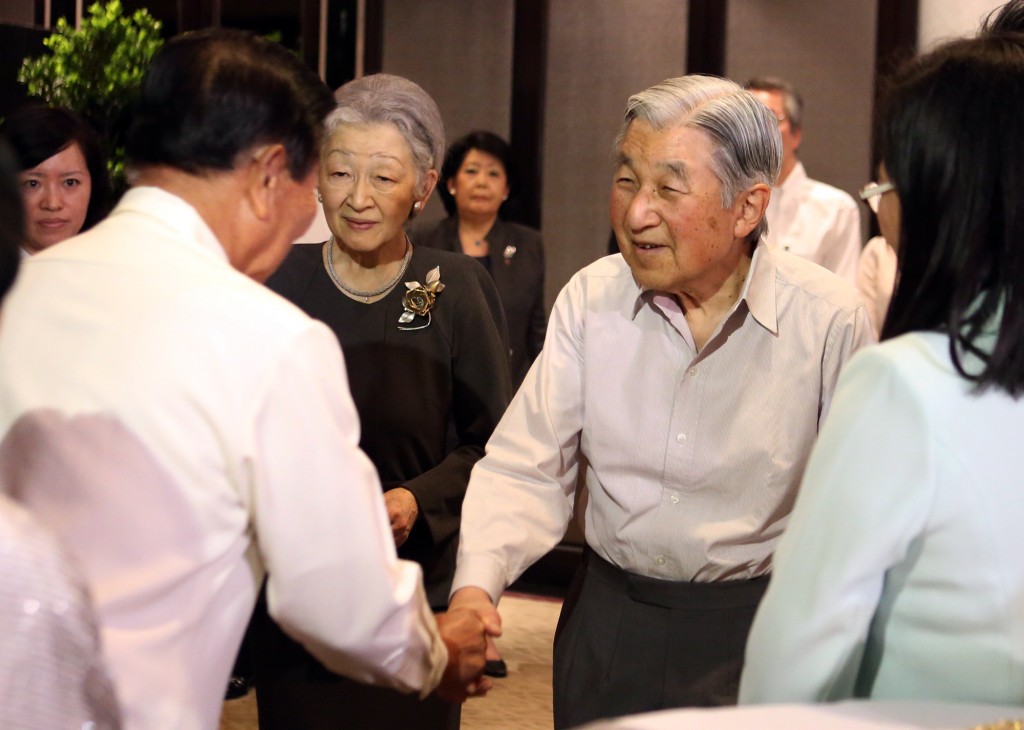Demigod image of Japanese emperor remains among followers

Japan’s Emperor Akihito and Empress Michiko arrive at the Sofitel Philippine Plaza, Pasay City on January 28, 2016 during a meeting with Japanese residents. The emperor and empress were in the country for five days to mark the 60th anniversary of the normalization of diplomatic ties between the two countries. NINO JESUS ORBETA
“When I was young, the emperor was seen by the Japanese as a god,” said Filipino-Japanese Carlos Teraoka, 85, recalling his school days in Japan when the morning ceremony included bowing deeply to honor then Emperor Hirohito.
Though the practice was scrapped after Japan lost World War II, many Japanese still revere the emperor, said Teraoka, who was one of 33 Japanese residents and descendants of Japanese nationals in the Philippines given the chance to meet Emperor Akihito and Empress Michiko on Thursday. The imperial couple were on a five-day visit in the country starting Tuesday.
“Even in my dreams, I did not think (this would) happen,” said Teraoka of his encounter with Japan’s royal couple at Sofitel Philippine Plaza Hotel in Pasay City.
“War-displaced Japanese descendants” was how Ines Yamanouchi P. Mallari, a third generation descendant and president of the Federation of Nikkei Jin Kai Philippines Inc., described her group.
Mallari said many Japanese came to the Philippines before World War II to work as laborers, building highways like Baguio’s Kennon Road, or settling in Davao and finding work on abaca plantations run by Japanese immigrants.
Article continues after this advertisementThe group now numbers 40,000, and includes the fourth generation of Japanese descendants, some 80 percent of whom live in Davao City.
Article continues after this advertisementThe hourlong meeting with the emperor and empress turned out to be an informal sharing of stories, with the room breaking into laughter and the royal couple taking time to mingle with and speak individually to the Japanese descendants.
Problems with identity
The Japanese-Filipino residents also talked about their problems with identity, with Teraoka describing how his life during World War II was one of “irony.”
His Japanese mother and two siblings were killed after the United States liberated the Philippines, he said. His eldest brother was killed by the Japanese army on suspicion that he was an American spy, while another brother was killed by Filipino guerrillas, he added.
Mallari said many of the Japanese descendants were recognized by Japan only in the 1990s, and that many more were waiting to be recognized as they remain “stateless” because they do not have any nationality to identify with.
They cannot go to Japan to appeal for recognition because they could not get passports, Mallari said.
On the other hand, Japanese descendants recognized by Japan also face problems when they return to the Philippines and bear their Japanese passports because they are considered foreigners and have to pay the necessary fees, she added.
Hope
But the meeting with the imperial couple gave them hope, Mallari said, about getting their problems on identity and recognition settled.
“Hopefully we get positive results, especially because we are recognized, and proof of (this) is our meeting with the emperor and the empress,” she added.